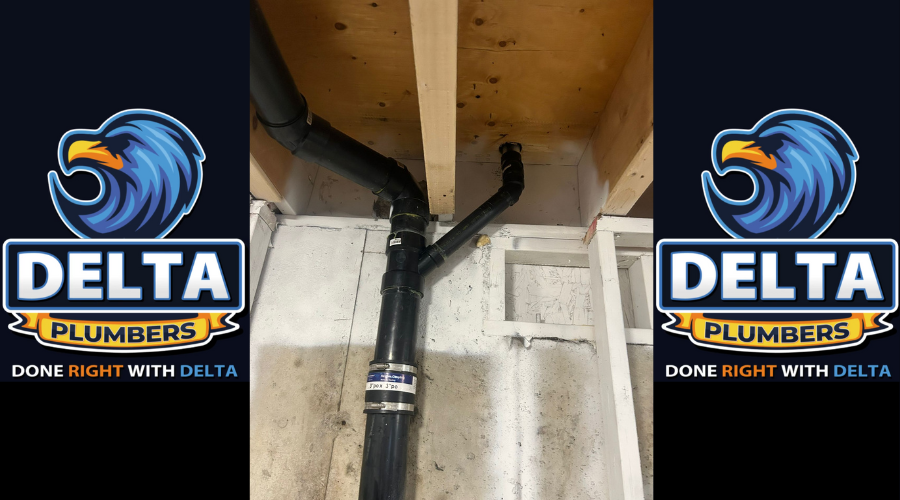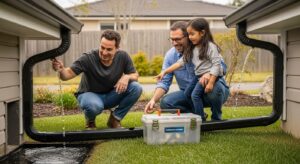Winter can be a challenging season for homeowners, especially when it comes to plumbing systems. As temperatures drop, plumbing issues such as frozen pipes, water blockages, and even burst pipes become more common, often leading to expensive repairs and major inconveniences. Proactive measures and proper maintenance can significantly reduce the likelihood of these problems. In this detailed guide, we at Delta Plumbers will provide you with effective strategies to prevent plumbing issues during cold weather. Following these tips will help you keep your plumbing system running smoothly, ensuring peace of mind throughout the chilly months.

Picture Source – Delta Plumbers
How to Make Sure Pipes Don’t Burst in Cold Weather
Burst pipes are one of the most common and damaging plumbing problems in winter. When water inside pipes freezes, it expands, exerting pressure on the pipe walls and joints. This pressure can cause pipes to crack or rupture, leading to leaks and significant water damage. Here’s how to prevent this issue:
1. Insulate Your Pipes
Proper insulation is key to protecting your pipes from freezing. Pipes in unheated spaces, such as basements, attics, garages, or crawl spaces, are particularly vulnerable. Use foam pipe insulation, heat tape, or pipe sleeves to cover exposed pipes. These materials help retain heat and prevent cold air from freezing the water inside.
2. Maintain a Consistent Indoor Temperature
Avoid setting your thermostat too low, even when you’re away from home. A temperature of at least 55°F (13°C) is recommended to keep the indoor environment warm enough to prevent pipe freezing. A consistent temperature reduces the strain on your plumbing system.
3. Allow Faucets to Drip
Running water is less likely to freeze. Letting your faucets drip slightly, especially those connected to exterior walls or unheated areas, relieves pressure in the pipes and keeps water flowing. This small trick can prevent freezing and bursting during extreme cold.
4. Seal Drafts and Leaks
Cold drafts around windows, doors, and pipe entry points can significantly lower the temperature in nearby areas. Use caulking or weather stripping to seal any gaps or cracks that might allow cold air to enter your home. This step will also improve your home’s overall energy efficiency.
5. Open Cabinet Doors
Under-sink pipes in kitchens and bathrooms are often installed along exterior walls, making them prone to freezing. Keep cabinet doors open to allow warm air to circulate around the pipes. This simple measure can make a big difference during particularly cold nights.
Also Read: Plumbing Codes and Regulations: Understanding Everything

Picture Source – Delta Plumbers
How Cold Is Too Cold for Plumbing?
Understanding the temperature threshold at which plumbing issues arise is essential for taking timely action.
When Do Pipes Freeze?
Pipes generally start to freeze when temperatures drop below 20°F (-6°C). However, factors like wind chill, pipe insulation, and exposure can cause freezing at slightly higher temperatures.
- Exposed Pipes: Pipes in unheated areas, such as garages or exterior walls, are the first to freeze.
- Underground Pipes: Although insulated by soil, these pipes can freeze during prolonged cold spells.
Extreme Cold Weather Risks
In areas where temperatures regularly dip below freezing, the risk of frozen pipes is significantly higher. Taking preventive steps before the cold season begins is crucial to avoid expensive repairs and water damage. For a professional help to prevent plumbing issues during cold weather call us today.
Also Read: How to Install a Garbage Disposal

Picture Source – Delta Plumbers
How to Prepare Your Plumbing for Winter
Preparing your plumbing for winter involves a mix of maintenance tasks and preventive measures. Taking time to winterize your plumbing system can save you from costly repairs and water damage.
1. Drain Outdoor Water Lines and Hoses
Disconnect and drain garden hoses to prevent water from freezing inside them. Turn off the water supply to outdoor spigots and drain any remaining water. For added protection, install faucet covers or insulators on exterior faucets.
2. Insulate Pipes in Vulnerable Areas
Use foam pipe insulation or heat tape to protect pipes in basements, attics, crawl spaces, and other unheated areas. Wrapping pipes in insulation helps maintain a stable temperature and prevents freezing.
3. Flush Your Water Heater
Sediment buildup in your water heater can make it less efficient and more prone to freezing. Drain and flush your water heater to remove sediment, ensuring it operates effectively throughout the winter.
4. Inspect for Leaks
Check your pipes, faucets, and fixtures for leaks. Even a small drip can freeze and cause significant issues during winter. Fixing leaks early can save you from larger problems later.
5. Schedule a Professional Inspection
Calling a licensed plumber, like Delta Plumbers, for a pre-winter inspection can help you identify and address potential vulnerabilities. Professionals can also winterize your plumbing system for added peace of mind.
Also Read: Plumbing Tips for Remodeling Your Kitchen

Picture Source – Delta Plumbers
Why Is My Water Not Working When It’s Cold?
Losing access to water during freezing weather is a frustrating experience. If your water isn’t flowing, frozen pipes are often to blame.
How to Identify Frozen Pipes
- No Water Flow: A lack of water or reduced flow from faucets is a key indicator.
- Frost on Pipes: Visible frost or ice on exposed pipes points to freezing.
- Bulging Pipes: Frozen water expands, causing pipes to bulge.
What to Do If Pipes Freeze
- Locate the Frozen Section: Inspect exposed pipes for frost or bulges to identify the problem area.
- Apply Heat: Use a hair dryer, heating pad, or warm towels to thaw the pipe slowly. Never use an open flame, as it can damage pipes or create a fire hazard.
- Keep Faucets Open: Allow faucets connected to the frozen pipe to drip. This helps relieve pressure and encourages thawing.
- Call a Professional: If you can’t locate or safely thaw the frozen pipe, contact Delta Plumbers for expert assistance.
Also Read: Shut-Off Valve Replacement: A Complete Guide

Picture Source – Delta Plumbers
At What Temperature Will House Pipes Burst?
Household pipes are at risk of bursting when temperatures drop below 20°F (-6°C). However, the exact risk depends on factors like pipe material, insulation, and exposure.
Why Do Pipes Burst?
When water freezes inside a pipe, it expands, increasing pressure. If this pressure becomes too great, the pipe can crack or rupture.
How to Minimize the Risk
- Use Insulation: Properly insulate pipes in vulnerable areas.
- Maintain Water Flow: Let faucets drip during extreme cold to prevent pressure buildup.
- Monitor Indoor Temperature: Keep your home consistently warm to prevent freezing.
Also Read: Bathroom Plumbing Fixtures: The Latest Trends in Canada

Picture Source – Delta Plumbers
Do I Need to Worry About Pipes Freezing?
Yes, frozen pipes are a serious concern during cold weather. Ignoring the risk can lead to:
- Water Damage: Burst pipes can flood your home, causing extensive damage to walls, floors, and personal belongings.
- Costly Repairs: Fixing frozen or burst pipes can be expensive, especially if the damage is widespread.
- Disruption of Water Supply: Frozen pipes block water flow, making it difficult to perform daily tasks like cooking, cleaning, and bathing.
Also Read: How to Replace a Toilet: Step-by-Step Guide

Picture Source – Delta Plumbers
How Long Can Pipes Stay Frozen Without Bursting
The amount of time a pipe can stay frozen without bursting depends on several factors, including:
- Pipe Material: Plastic pipes are more flexible and less likely to burst than metal pipes.
- Temperature: The lower the temperature, the higher the risk of bursting.
- Water Pressure: High pressure increases the likelihood of rupture.
What to Do If Pipes Freeze
Thaw frozen pipes immediately using safe methods, and call a professional plumber if necessary. Acting quickly can prevent the pipe from bursting.
Conclusion
Winter plumbing issues are a major concern for homeowners, but with proper preparation and maintenance, they can be prevented. Insulating pipes, draining outdoor lines, and maintaining consistent indoor temperatures are all effective strategies for safeguarding your plumbing system.
If you encounter frozen pipes, reduced water flow, or other plumbing issues and wants to prevent plumbing issues during cold weather, Delta Plumbers is here to help. Our experienced team is equipped to handle winter plumbing challenges and keep your home safe and functional. Don’t wait until it’s too late—prepare your plumbing system now and enjoy a worry-free winter!









